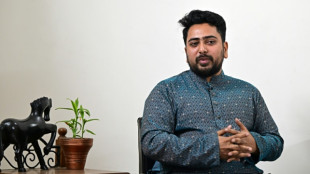
-
 Wild weather leaves mass blackouts in Australia
Wild weather leaves mass blackouts in Australia
-
China consumption slump deepens as February prices drop

-
 Phone bans sweep US schools despite skepticism
Phone bans sweep US schools despite skepticism
-
Some 200 detained after Istanbul Women's Day march: organisers

-
 'Grieving': US federal workers thrown into uncertain job market
'Grieving': US federal workers thrown into uncertain job market
-
Remains of murdered Indigenous woman found at Canada landfill

-
 Women will overthrow Iran's Islamic republic: Nobel laureate
Women will overthrow Iran's Islamic republic: Nobel laureate
-
Women step into the ring at west African wrestling tournament

-
 Trump's tariff rollback brings limited respite as new levies loom
Trump's tariff rollback brings limited respite as new levies loom
-
Hackman died of natural causes, a week after wife: medical examiner

-
 Oops, we tipped it again: Mission over for sideways US lander
Oops, we tipped it again: Mission over for sideways US lander
-
Cyclone Alfred downgraded to tropical low as it nears Australia

-
 Global stocks mixed as Trump shifts on tariffs weighs on sentiment
Global stocks mixed as Trump shifts on tariffs weighs on sentiment
-
Trump says dairy, lumber tariffs on Canada may come soon

-
 Trump cuts $400 mn from Columbia University over anti-Semitism claims
Trump cuts $400 mn from Columbia University over anti-Semitism claims
-
US Fed chair flags policy uncertainty but in no rush to adjust rates

-
 Adopted orphan brings couple 'paradise' in war-ravaged Gaza
Adopted orphan brings couple 'paradise' in war-ravaged Gaza
-
Oops, we tipped it again: Mission over for private US lander

-
 Greenland's mining bonanza still a distant promise
Greenland's mining bonanza still a distant promise
-
Pope 'stable' as marks three weeks in hospital with breathless audio message

-
 Shares slump on Trump tariffs tinkering, jobs
Shares slump on Trump tariffs tinkering, jobs
-
Mission over for private US lander after wonky landing

-
 Thousands stranded as massive WWII bomb blocks Paris train station
Thousands stranded as massive WWII bomb blocks Paris train station
-
UK court cuts longest jail terms on activists, rejects 10 appeals

-
 US hiring misses expectations in February as jobs market faces pressure
US hiring misses expectations in February as jobs market faces pressure
-
S.Sudan heatwave 'more likely' due to climate change: study

-
 US company says Moon mission over after landing sideways again
US company says Moon mission over after landing sideways again
-
Trump says farmers keen to quit 'terrible' S. Africa welcome in US

-
 US stock markets rise as investors track Trump tariffs, jobs
US stock markets rise as investors track Trump tariffs, jobs
-
US hiring misses expectations in February, jobs market sees pressure

-
 Disco, reggae on King Charles's 'eclectic' Apple playlist
Disco, reggae on King Charles's 'eclectic' Apple playlist
-
Australian casino firm strikes deal to avoid liquidity crunch

-
 Deposed king's grandson makes low-key return to Egypt
Deposed king's grandson makes low-key return to Egypt
-
Stock markets, bitcoin down as Trump policies roil markets

-
 Bangladesh student leader aims to finish what uprising began
Bangladesh student leader aims to finish what uprising began
-
Japan, Britain stress free trade in Tokyo talks

-
 Spain targets men's 'deafening silence' in gender violence battle
Spain targets men's 'deafening silence' in gender violence battle
-
Spain under pressure to abort nuclear energy phase-out

-
 Hungary femicide sparks outcry on gender violence
Hungary femicide sparks outcry on gender violence
-
Trial of Maradona's medics to start four years after star's death

-
 Women spearhead maternal health revolution in Bangladesh
Women spearhead maternal health revolution in Bangladesh
-
Apple step closer to seeing end of Indonesia iPhone sales ban

-
 China's exports start year slow as US trade war intensifies
China's exports start year slow as US trade war intensifies
-
Asian stocks, bitcoin down as trade uncertainty roils markets

-
 China tariffs aimed at Trump fan base but leave wiggle room
China tariffs aimed at Trump fan base but leave wiggle room
-
Musk's SpaceX faces new Starship setback

-
 Trump signs executive order establishing 'Strategic Bitcoin Reserve'
Trump signs executive order establishing 'Strategic Bitcoin Reserve'
-
Australian casino firm scrambles for cash to survive

-
 Musk's SpaceX faces setback with new Starship upper stage loss
Musk's SpaceX faces setback with new Starship upper stage loss
-
US and European stocks gyrate on tariffs and growth


'Lives at risk': Women's medical training ban threatens Afghan health sector
From her private hospital in Afghanistan's capital, doctor Najmussama Shefajo predicts a rise in maternal mortality rates "within three or four years", following the latest restrictions on women's education.
The Taliban's supreme leader is reportedly behind a ban on women studying midwifery and nursing at training institutes across the country, already among the worst in the world for deaths in childbirth.
"We may not see the impact very quickly but after three to four years we will see the maternal mortality rate go up and up," said Shefajo.
"People will for sure have more babies at home. But what about complications? What about operations? Many procedures cannot be done at home."
Since the Taliban government banned women from universities two years ago, Shefajo has been giving on-the-job medical training, including in midwifery and nursing.
But she said she doesn't have the capacity or facilities to take on every woman keen to learn in her hospital, despite no shortage of volunteers.
"Midwifery and nursing are like the two wings of the doctors; if the bird doesn't have wings, it cannot fly," she added, ducking behind curtains to treat patients.
Already Afghanistan is facing a "desperate shortage of trained healthcare workers, especially women", according to the UN children's agency UNICEF.
No official notice has been issued by the Taliban government, but health ministry sources and managers of training institutes said this month that they had been told to block women from classes.
- 'Catastrophic consequences' -
Restricting medical training is the latest action against women's education since the Taliban authorities swept to power in 2021, imposing rules the United Nations has called "gender apartheid".
"In a country where women and children depend on female health professionals for culturally sensitive care, cutting the pipeline of future health providers would put lives at risk," UNICEF Executive Director Catherine Russell said in a statement.
Training institutes had ensured women would continue to learn healthcare skills, such as midwifery and nursing, or laboratory work, pharmacy and dentistry.
The ban would impact about 35,000 women studying at medical training centres, according to a figure from a health ministry source.
"We are concerned about the effects on the already fragile healthcare system," said Achille Despres, spokesperson for the International Committee of the Red Cross in Afghanistan, where the organisation offers health services and training.
International NGO Doctors Without Borders (MSF), which runs some of its busiest maternity hospitals in Afghanistan, also warned of the consequences of the ban, given that the nation's "medical needs... are huge".
"There is no healthcare system without educated female health practitioners," country representative Mickael Le Paih said in a statement.
Afghanistan and MSF already face a dearth of obstetrician-gynaecologists (OB-GYNs) in a country with high fertility rates where women often have children from a young age, Le Paih told AFP.
And demand is only likely to increase, he added, as almost half of Afghanistan's population is under 15 years old, according to a 2022 health ministry report.
"You can imagine the impact in several years' time when you will have a large number of women reaching childbearing age," he said.
The ban will undoubtedly further strain access for the 70 percent of the population living in rural areas.
- 'Getting worse' -
After news of a ban spread last week, some training facilities closed their doors immediately, while others rushed to hold final exams and graduations, as still others said they would open as normal after the winter break unless they received a written order.
Shefajo and others want to provide online lessons, but say the lack of practical experience would be detrimental to learning.
Hadiya, 22, recently finished her first year studying midwifery, after having been forced to quit computer science studies at university and English courses.
"We may have midwives now, but medicine is changing every day... and it is clear that the situation in Afghanistan in the field of child and mother health is getting worse," Hadiya told AFP.
"It's like we're in a cage, all the girls are thinking of finding a way to leave here so we can at least continue our studies and reach our goals," she said.
"When I see the situation in Afghanistan, I think no child should be born here."
S.F.Lacroix--CPN
